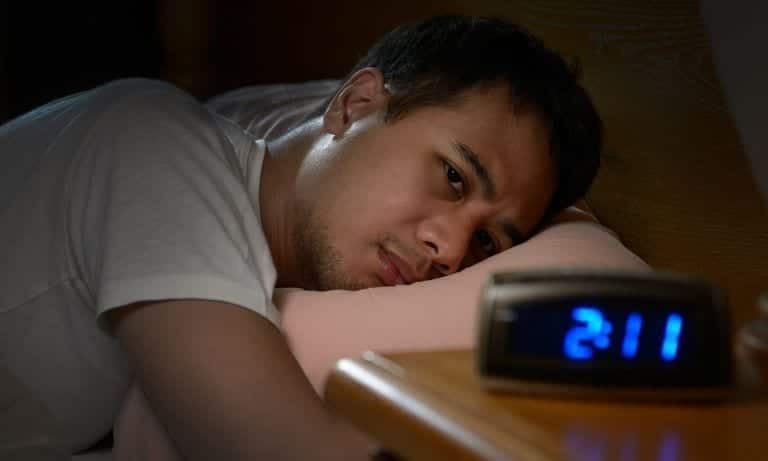Are the worries of life keeping you up at night? Do you have trouble unwinding at the end of the day, and end up staring at the ceiling for hours trying to fall asleep? If getting normal rest is troublesome for you, there is hope apart from having to pop a sleeping pill. Here are some helpful tips for overcoming insomnia with just lifestyle changes and proper sleep hygiene.
1) Avoid Processed Foods
You are probably starting to notice a pattern with many of our articles on conquering illness — your diet is key. Food people eat nowadays contain high amounts of refined sugar, processed flours, chemical flavor enhancers and preservatives. The average person simply isn’t getting the nutrients to achieve systemic equilibrium. Refined sugar and other simple carbohydrates, for instance, are very quickly absorbed into the bloodstream where they tend to overstimulate the body and interfere with normal sleeping patterns [1].
According to Dr. Michael Murray, N.D., artificial food colorings may also be to blame. These chemical compounds trigger a stimulant response which can put your body into “fight or flight” mode. Adrenaline, also known as cortisol, and other hormones are then released in excess, signalling your body that it is time to be awake and alert. Cutting processed foods out of your diet, particularly from the time between when the sun goes down and when you go to bed, can help promote restful sleep (http://doctormurray.com).
2) Fortify Your Diet With Whole Fruits And Vegetables
Since cutting outcertain foods from your diet leaves an even greater nutritional void, it is important to replace these foods with more appropriate ones. And while this may not apply to everyone, acidic foods can cause insomnia. That’s because the liver and kidneys need to work harder to maintain your blood pH, and that itself can make your body more active. Another explanation is that acidic foods can cause heartburn, rendering sleep efforts useless. Alkaline foods, like some vegetables, may help lessen this burden. Some people have reported success overcoming insomnia by switching to a completely alkaline-forming diet.
Along with this, consuming high-density “green” supplements and powders can deliver a diverse array of probiotics, microalgae, and other foods of which you are likely not eating enough. Juicing fresh, organic fruits and vegetables in the morning and mixing in some green superfood powder is a great way to start your day on the right foot so you will feel ready to sleep once night time arrives.
3) Turn off all your electronic gadgets a few hours before going to bed.
In order for your body to know that it is the appropriate time to begin producing sleep hormones like melatonin, light sources must be kept off or very dimly lit in the few hours prior to bedtime. The constant glow that comes from looking at your monitor and mobile phone screens basically signals your brain that it is still daytime. Eventually this inhibits the normal production of sleep hormones that calm your brain and induce restfulness.
“We all suffer from light pollution — we have lights on 24/7, which keeps our brains chronically aroused,” says Rubin Naiman, a clinical assistant professor of medicine at the University of Arizona‘s Program in Integrative Medicine, and sleep director at the Miraval Resort in Tucson, Arizona, about how excess light can create insomnia. “Most people don’t recognize how essential darkness is for a sound night’s sleep” (http://www.msnbc.msn.com).
4) Exercise daily to exert energy.
Another common cause of insomnia is lack of physical exercise, which creates natural sleepiness in your body after a long day. Many people sit in fluorescent-lit cubicles for most of the day, and come home and spend more sedentary time on the couch watching television. By engaging in at least 30 minutes of moderate aerobic activity every day, even if this means just going for a quick walk around the neighborhood, you will naturally fatigue your body to the point that sleep will come much more easily at the end of the day. And if you find jogging not fun enough, we recommend you try out jiujitsu or MMA!
“The body must exert energy to get physically tired,” says James Maas, a professor of psychology at Cornell University, and author of the book Power Sleep. And this energy exertion, numerous studies have shown, actually works better than benzodiazepines and other types of sleeping pills at inducing sleep and improving sleep quality.
5) Avoid Caffeine, Alcohol and Nicotine
These substances affect sleep in different ways. Naturally, caffeine and nicotine are stimulants and will prevent you from sleeping. While some may find alcohol beneficial for sleeping, it affects sleep quality through a number of pathways. That includes altering brain waves, circadian rhythm and REM sleep[2].
6) Avoid Naps During Daytime
This may seem like a no-brainer, but we all do this at some point. We don’t get enough sleep at night, so we take a nap in the afternoon. But then at night we’re not sleepy anymore. This vicious cycle is hard to break. One thing you could do is take power naps. 10 minutes will recharge you enough to last you the rest of the day.
7) Relaxation Techniques
Meditation, yoga and breath focus are examples of relaxation techniques. These aim to quiet your mind. Having a stressful life is most certainly one of the major causes of insomnia. Try to assign a time for all those worries and leave the rest for relaxation. For example, leave work related stuff back at work and don’t bring it back home.
8) Limit Activities On Your Bed
The human brain associates the environment with what you do. If you work while on your bed, your brain will think that you’re working, making it hard to fall asleep. That’s why limiting your bed for only sleep and sexual activities is so important.
9) Salvaging A Good Sleep
If you find it hard to stay asleep for whatever reason, don’t just lie on your bed. Get up and do something for 30-60 minutes before going back to bed. That way it helps you to “reset” and hopefully you’ll fall asleep by then.
References:
- How Eating Sweets Affects Your Slumber and Energy. (2020, January 23). Retrieved from: https://www.sleep.org/articles/sugar-impacts-sleep/
- How Alcohol Affects the Quality-And Quantity-Of Sleep. (2020, June 10). Retrieved from: https://www.sleepfoundation.org/articles/how-alcohol-affects-quality-and-quantity-sleep

